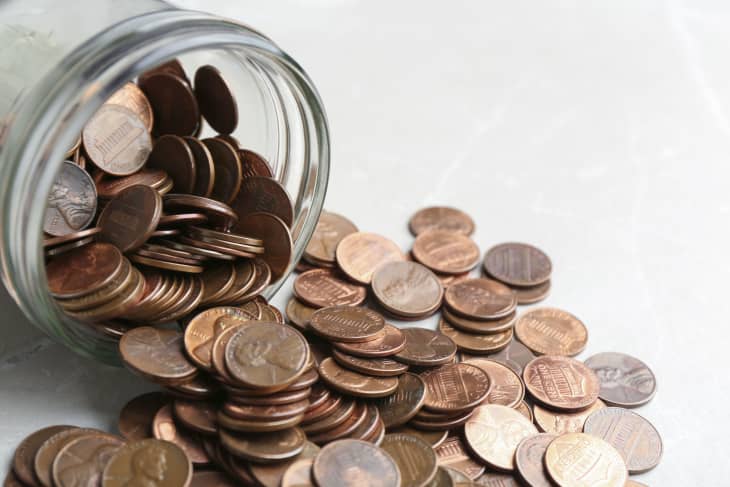This Surprising Coin-Cleaning Method Uses a Popular Condiment

You know those pennies, nickels, dimes, and quarters in your wallet have been passed around a lot. And that means they’re probably pretty grimy. You’ve probably accidentally washed a few forgotten bucks in a pants pocket here and there, but that’s not the only way you can clean your money. In fact, there are plenty of ways to clean coins if you’re worried about spreading germs.
To get you started, here are six ways you can get your coins sparkling, and most of these methods use products you likely already have at home. Plus, giving your spare change a glow-up can actually be a lot of fun — especially when you consider the science behind how it gets cleaned. (Important note: You don’t want to clean collector-edition coins because there’s value in the wear and age of the coin.)
Dish Soap
If you want to give your coins a stronger scrubbing than a quick rinse, there’s nothing better than your regular dish soap. Just add a bit of dishwashing liquid to a bowl of warm water, mixing the two together until you have a nice, foamy bubble bath in which to drop your coins.
You can let them soak for a bit or get right to work, scrubbing them clean with a washcloth or a scrub brush (an old toothbrush comes in clutch for jobs like this) and a bit of elbow grease. When you’re done, place them on a towel to air dry or pat them dry with a paper towel.
Note: Water with or without dish soap is the only cleaning method you should use if your valuable coin has visible dirt, according to Douglas Mudd, curator and museum director at the American Numismatic Association. “If the coins are actually dirty, it’s safe to do something like use water,” Mudd says. “You can go as far as using some mild dish soap,” he adds. But Mudd warns against scrubbing or using a paper towel to dry the coins, instead saying you can pat them dry with a soft cloth.
Vinegar and Salt
According to the U.S. Mint, you can clean pennies with some of the ingredients you likely already have stashed away in your kitchen or pantry. For this method, you’ll need a non-metal bowl, vinegar, salt, and some dirty change.
Combine the vinegar and salt in the bowl, and then stir until the salt dissolves. Once you have a pure liquid mixture, you can add your coins. This fast-acting solution will begin to work in seconds, stripping your coins — especially pennies manufactured prior to 1982 — of their telltale signs of aging, like copper oxide. You’ll need to flip them over to ensure you’re getting both sides, but once they’re clean, you can pull them from the mixture and rinse them with water before patting them dry with a clean paper towel.
Baking Soda
If you’ve used the above vinegar method to get your coins mostly clean, you can turn to baking soda to get them extra shiny.
Baking soda is great at getting into all of those small spots where dirt and grime can be hard to remove — you can use it alone or by mixing a bit of water with it to make a paste. Once you have the baking soda on the coin, you can rub it onto the coin and rinse.
Ketchup
Apply a small amount of ketchup to your coin, rub it with a cloth or toothbrush for a few minutes, and rinse.
Using ketchup to clean your coins is actually a whole lot like completing a mini science experiment in your home. The vinegar and tomato in ketchup work as an acid, which can break down those surface stains on your coins — the acid in the ketchup mixes with the copper oxide on the surface of the pennies to clean them.
Lemon Juice
A lot of the best tricks for cleaning coins involve acids, which is why lemon juice is an excellent choice. You can use the bottled stuff from your fridge or squeeze some fresh if you’d like (you’ll only need enough juice to cover your coins with about an inch of liquid).
After they’ve soaked for about five to 10 minutes you can pull them out one by one and buff them out with a paper towel. Not only will this help you bring your coins back to their bright and shiny origins, but it will also leave them smelling lemony fresh!
Commercial Coin Cleaner
For those who want to bypass DIY methods and go straight to something tried and true, there’s commercial coin cleaner. You’ll need to gear up for this method, though, because these cleaners are made with heavy-duty acidic compounds, so gloves and glasses are a must.
Pro tip: Follow the manufacturer’s instructions exactly when using commercial cleaners, as each formula contains its own ingredients and directions. And remember, these directions include specifics about why you should never mix commercial cleaning agents with other compounds. Doing so could cause a dangerous chemical reaction that could not only damage your coins but also your health.